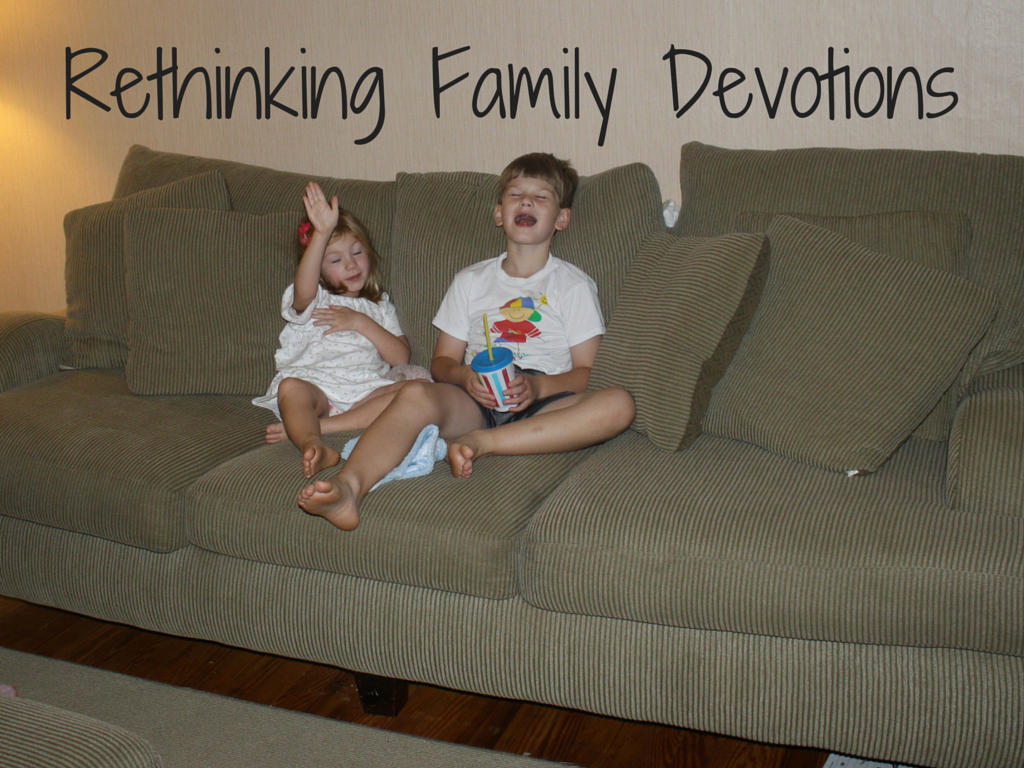One of my readers asked me to write a post on how the Lawrences do our family devotions. (GAH! I have READERS! This one doubles as my son’s Sunday School teacher, but details, details….) I am so happy to accommodate her request since I love to pretend I’m the expert on things.
 |
| This picture is so misleading. Needing a picture of that couch for another post, I sat them on it and said, “Do something funny.” This is what I got. |
When I first starting blogging, Nate suggested I put our self-made family devotion material up as free downloads. I shot the idea down like a deer in season. And laughed as I did. Mainly because our family devotions have ended on a less than stellar note more often than not. I figured what we were doing probably shouldn’t be duplicated by the world at large.
Unless, of course, you want a piece of this kind of action…
- 4 year old breaking out into “Let It Go” in the middle of her prayer.
- Fighting over who gets to pick the first worship song.
- Refusing to participate.
- Parents getting angry because children won’t participate.
- Fighting over who prays first.
- Praying over each other. (Not in a spiritual way. More like trying to pray louder than the other because they’re mad they didn’t get to go first.)
- Fighting over who gets to play the part of Jesus in any given Biblical scenario.
I’m sure God must pleased.
So why do we keep at it when clearly it’s not always a picnic? We feel compelled to be our children’s primary spiritual teachers. Simple as that. And we have a faint glimmer of hope that one day we might regularly leave that time together with nary a sour attitude. (If you’re there already, send me stories! I need inspiration.)
Before I tell you what we do, let me debunk some myths about the FAMILY DEVOTION TIME.
1) Everyone needs to leave the time happy to consider it a success. Not true. For our family, more times than not someone leaves disgruntled. And I totally get how that can feel like failure. Especially when, as parents, we so want to come away from that time feeling like they got it. But success is not always smiles and agreeing nods and insightful questions. Success is not always happy, compliant children. Success is when your kid’s Sunday School teacher tells you she told the entire Bible story to the class before the teacher could fill in the details. Success is when your son makes a connection from scripture to his actual life during everyday conversation. Success is when they remind YOU of a point from last weeks devotion. They are listening. Even if they’re frowning while doing it. Success is God’s word working it’s way into their little hearts over months and years until it begins to affect how they think and what they do. Don’t let their apparent unhappiness derail your determination to do that!
2)Family Devotion Time needs to be nightly, or at least regular to be a success. Is that the ideal? Absolutely. Is that my preference? You betcha. And if the rest of our lives would simply cooperate, I’m sure we could swing it. But the truth is we’re dealing with real while aiming for ideal. Real is some nights fall apart at the seams and we’re just glad to get them in bed. Real is kids get sick and we let them lay around and watch How to Train Your Dragon. Twice. Real is we do ballet on Thursdays and by the time we eat and finish homework, it’s time for bed.
Our family works toward doing family devotions most school nights with the exception of Wednesdays, since we’re at church. But honestly, we’re doing great to get two nights in a week during this particular season. At other times we’ve managed 4 nights a week. The important thing is to keep striving to make it a priority and get it in there as often as you can.
3) Family Devotions should look a lot like Sunday School. You know. Children sitting quietly while teachers tell the story. Happily singing “Zacchaeus Was A Wee Little Man” as a group to reinforce the Biblical truth. A quiet, reverent prayer to put an official close on the time. Honestly, that’s just not our speed. The good news is there are no official rules on what family devotions should look like. You have freedom! Not to mention that family devotions will probably look drastically different for those with 5 year olds and those with middle schoolers.
Now that you know we’re the most spiritual family on the block, I’m sure you’re dying to replicate what we do. Here is our general pattern:
1) We give the kids a few minutes warning to wrap up what they are doing and head to the living room. Generally, we do family devotions last thing before bedtime, but that has changed with different seasons. Pick a time when they are less likely to be tired and obstinate. (Common sense, right?)
2) Each kid picks a praise song from a kids worship site. (Cause we all know I’m not about to lead any singing.) There are some great web sites with fun kids praise music out there! The one we usually use is Worship House Kids. Youtube is a good resource too. We let the kids go nuts while singing. Dance. Jump around. The point is to help them associate worship as a whole body and heart kind of thing. We try to lead them to pick both fun, upbeat songs and reverant ones. But let’s be honest, here. They’re 6 and 4. Reverant rarely happens.
3) Next, we tell the Bible story. It’s our pattern for Nate to usually lead on this, but don’t get too legalistic here. We have found it’s much easier for them to pay attention when we tell the story verses reading it. The past couple of years we have been slowly working our way through the major stories of the Bible, that way they learn the events in context of what happened before and after. We currently use The Jesus Storybook Bible as a guide, but there are lots of other good Bible story books to choose from. Mainly, just pick something age appropriate.
While Nate is telling the story, he almost always uses some kind of prop or activity to get them involved. When we were learning about Solomon building the temple, we brought out the blocks. He let the kids build a simple structure while he told the story. When he taught on Jesus raising Lazarus from the dead, he let one of the kids “play dead” while the other pretended to be Jesus. (That one was a hoot. “Can I just leave her dead?”) The goal is to put some sort of tangibility on these stories that might seem far removed from their everyday lives. Using multiple senses helps them solidify the concepts.
4) Nate and I pray, but give the kids the option. At first I really pushed each of the children to pray. But then I realized I was doing more harm than good with one in particular who doesn’t like to be pressed into doing things. I decided it was far better for him not to pray, than to learn praying was something you do to make Mommy happy. So we don’t make a big deal of it anymore. Funny thing, he now prays fairly regularly during family devotional. Leading by example is definitely the way to go in that area!
That’s it ya’ll. We don’t use any material, although I know there is lots of good stuff out there. Mainly, we just needed a simple plan we could stick to. Nothing complicated and very little preparation required.
I hope this is an encouragement to those of you who want to start (or restart) a family devotion time, but have felt the task was daunting. Trust me when I say teaching children is NOT my spiritual gift. If I can do this, so can you. Let me know how it goes!

Love this! Thanks for being real about your family devotion time. This really encouraged me. 🙂
Ha ha. I can just imagine someone breaking into “Let it Go.” Hey, I think that could be appropriate. Just add in “give it to Jesus” and you’re set!